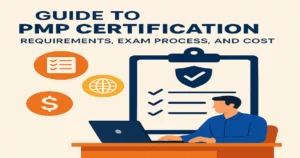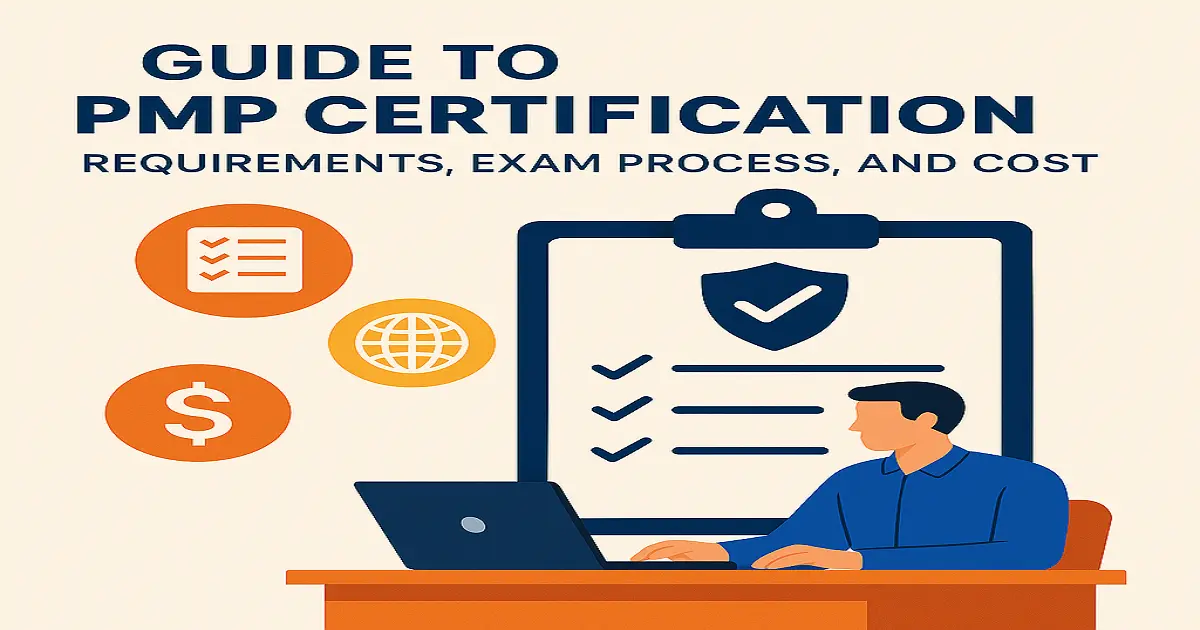It is the Project Management Professional (PMP) certification is an internationally recognized quality standard that project management professionals can attain. It validates the ability to lead projects with a high level of expertise as well as managing teams and delivering results across all industries. The achievement of PMP certification shows high-level competence and provides career opportunities across the globe.
What is PMP?
PMP is the abbreviation for Project Management Professional, a certification granted to PMP by PMI, Project Management Institute (PMI). It tests project managers across different areas, including people, processes and business environment to ensure that the knowledge is consistent regardless of the industry background.
The PMP credential is a world-wide standard for the quality of project management and helps organizations trust their project managers to deliver positive results. Based on the PMI’s strict requirements, the credential is recognized across a range of industries from construction and IT to finance and healthcare. The PMP test is based on the most current PMBOK (Project Management Body of Knowledge) Guide that is frequently updated to reflect current best practices in the industry.

Significance and Benefits
- International recognition across all industries for management and project leadership abilities.
- Expertise in motivating as well as lead and manage teams of different sizes by using agile, predictive and hybrid approaches.
- Networking opportunities for expanded networking with other professionals in project management along with access to PMI tools.
- Improved job prospects, higher the potential for salary increases, and trust in organizations.
History and Evolution
- PMI was established in the year 1969.
- The first PMP exam was conducted in 1984. It has since been updated then to reflect changing industry standards.
- PMBOK Guide, published by PMI was made the framework of reference for certifications in 1987. It is then updated every couple of years to reflect changes in methods and information.
PMP Certification Exam Structure
The PMP test is a tough test that consists of 180 questions in three hours and fifty minutes. This includes multiple-choice, hotspots and fill-in-the-blank format with a limited number of questions.
Domains and Format
- Process (50%)- The focus is on methods and resources, scheduling budgeting, and the need to make changes to the project.
- People (42%)- Questions on team leadership as well as conflict management, mentorship and stakeholder involvement.
- Business Environment (8%)- The Business Environment covers the compliance of organizations, while delivering value and facilitating the organization’s transformation.
The success is determined by competence across all domains with no official numbers for passing scores. Experts in the field determine the minimum threshold to pass by conducting psychometric analyses.
PMP Certification Requirements
The eligibility criteria for PMP certification is based on educational qualifications, professional experience as well as formal training in project management. PMI has strict criteria for entry to ensure that the credential’s validity.
Educational and Experience Prerequisites
There are two main routes:
| Education Level | Project Management Experience | Project Management Education |
|---|---|---|
| Second degree (high high school or the equivalent) | Five years (60 months) managing projects for 5 years (60 months). | 35 hours of certification course (or CAPM) |
| A four-year college degree (bachelor’s or greater) | 3-years (36 months) in charge of projects for 3 years (36 months) | 35 hours of certification course (or CAPM) |
- Experience should include leading and controlling projects, not simply being a member of a team.
- The training hours may be derived from workshops, formal classes online training, university courses that are approved by PMI.
CAPM as an Alternative
It is the Certified Associate in Project Management (CAPM) is a preparation qualification for those who don’t yet satisfy the PMP specifications. CAPM certification can enhance education or experience to qualify for PMP certification.
The PMP Certification Process
- Verify eligibility Check that your the qualifications, experience, and the training you have received meet PMI requirements.
- Create an PMI Account Utilize the PMI platform. PMI platform to launch your application.
- Create Documentation Collect evidence of qualifications, experience in projects management experience, and certifications for training.
- Complete the application Note project specifics and durations, responsibilities and hours of learning. Some applications are selected to be random audits. These may require additional documentation such as authenticated experience verifications or transcripts.
Application Sections
Candidates need to fill in:
- Academic Education
- Professional Education/training
- Experience leading projects
- Exam information and the availability.
Application Audit
Certain applications are randomly audited and require applicants to submit:
- Degree/diploma copies
- Verification of experience by the supervisor
- Evidence of training in project management.
Exam Preparation
To prepare for the PMP test typically takes between two and four months of intense study. Some of the best resources are:
- PMBOK Guide and Supplementary PMI standards.
- Training courses in formal format, workshops bootcamps, online classes.
- Forums, study groups for community members and exams for practice.
- PMP Certification Exam Prep Simulator
Regularly scheduled study times and diverse sources result in the highest pass rates.
Costs and Fees
The PMP cost of certification is made up of a number of parts:
- PMI membership annual fee of $139 USD (optional but does not include exam discount on fees)
- Exam fees $45 USD for PMI members and $555 USD for non-members.
- Materials for training/preparation: $500-$1,500 based on the course’s type
- Retake fees: Charges that are that are incurred when a re-examination is required.
The process of joining PMI prior to registering is usually affordable and provides the ability to access professional growth tools and networking opportunities.
Maintaining PMP Certification
PMP is a certificate but not a license. it is required to be maintained by ongoing education.
- PMP holders are required to attain sixty Professional Development Units (PDUs) every three years to maintain their active certification.
- PDUs can be earned through workshops, webinars, or training or even professional contributions to project management.
Exam Day and Result
On exam day:
- The proctored online or in-person test is conducted at an accredited test center.
- Results are immediately displayed after the process has been completed.
- Score reports breakdown the level of proficiency according to domains in a way that highlights strengths and areas to improve.
- If they fail, candidates may be retested after a period of waiting.
Frequently Asked Questions
Is PMP Worth It?
PMP is a globally acclaimed qualification particularly for advancement in industries that rely on project management. Certified professionals usually earn higher wages, promotions and more responsibilities on projects.
Can Anyone Apply?
Only those with proven experience in project management and formal education are eligible to apply. Entry-level project contributors should look into the CAPM route before moving to PMP.
How Often is the PMP Exam Updated?
The exam changes regularly in response to changes in PMBOK as well as globally best practices to ensure that the credential is current.
Conclusion
PMP accreditation is recognized as the standard of excellence for project managers that demonstrates commitment, competence as well as professional development. Candidates must ensure that they are eligible to apply for the certification, meticulously plan their preparation, and make plans to keep their credentials through continual training and growth. It is a demanding process but the benefits are huge both in terms of financial and terms of satisfaction with your career.
